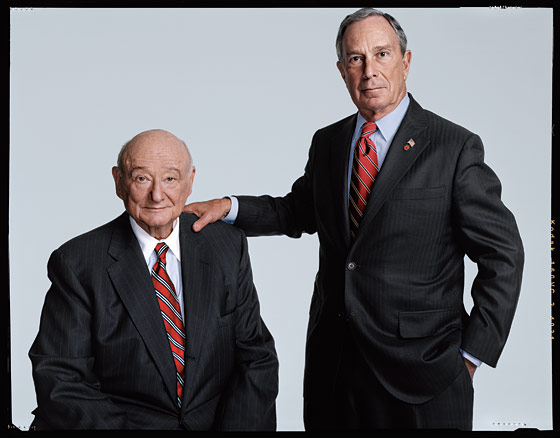 |
Ed Koch and Michael Bloomberg
(Photo: Dan Winters) |
The current occupant leaned back on a plush red couch; his puckish predecessor sat in a stiff-backed chair. Michael Bloomberg and Ed Koch were in one of City Hall’s private offices, talking seriously about the issues and enemies they’ve confronted as mayor, and the changes in the city they’ve led. But their tone was as warm and relaxed as old war buddies’.
New York: You’ve both dealt with crises that threatened the city’s physical and economic survival. How worried are you by the current financial mess?
Ed Koch: Wall Street and the city will survive. The only thing to worry about is that the rich get preferred under all these programs, and the middle class comes after them. It should be the other way around. The rich should be the last to get through the eye of the needle.
Michael Bloomberg: No question, these times will be tough and we’re going to have to work together. I always say that nothing goes up forever—and that’s why we used the good times to prepare for the tough ones. So yes, these are difficult days, but we know how to get through them. We’ve done it before and will do it again.
NY: Mayor Bloomberg has said that the city made a “mistake” during the seventies fiscal debacle by allowing quality-of-life services—the Police Department, schools, parks—to deteriorate.
EK: You can’t call it a mistake! It was a question of resources. The reason we got where we got is we spent money we didn’t have. That started in the last year of Wagner’s administration and went to its zenith in the Lindsay and Beame administrations.
MB: Ed was elected in 1977 to get the city back on its feet, and he did a spectacular job. The lesson is, when you walk away from these investments during tough times, you walk away from your future—and we won’t do that.
NY: What did starting in the middle of a crisis—for Mayor Koch, the fiscal disaster; for Mayor Bloomberg, the aftermath of 9/11—teach you about being mayor?
EK: When I was elected, I said to myself, Can I do this? Seven people ran, and some of them were extraordinarily capable. And I said to myself, But the people picked me! For good or bad. And now I have to do my best. And I had only one or two sleepless nights in twelve years. Because I thought to myself, It’s working! The key was, get people to follow you. I used to say, to crowds—because I went out in the streets a lot—“If you follow me, I will lead you across the desert!” That’s a nutty thing. But they followed me! And that was key, because you had to demand great sacrifice from the people of the city. And the people who had to sacrifice the most were the poorest. Because that’s where the budget goes. Two-thirds of the budget. All the left-wingers, the Village Voice people, yelled, “He’s balancing the budget on the backs of the poor!” And I said, “Who do we spend the budget on?”
MB: I’d argue that Ed Koch—and Michael Bloomberg, both—had a real advantage coming in. Because we both came in in difficult times, and it is easier to govern in difficult times than it is in flush times. You have more leverage with legislatures; the public is more sympathetic, they know it’s not easy and they might not be happy with your decision, but what they want is somebody they think is at least trying to do what’s right. One year I closed half a dozen firehouses—nobody ever lost their job! The firefighters, we moved them to where the public had moved! We should be doing that every year! I raised taxes—our police and firefighters wanted to get paid, surprise, surprise. And I put a smoking ban in—everybody’s gonna live longer. My approval was down to 25 percent, but on the questions—does he care? Is he honest? Is he hardworking?—75 percent approval. People want a genuineness. I think it’s useful, also, to be a character. Ed was better at that than I am. I tend to not be as expansive.
EK: My personality was such, you hit me, I hit you back. [Laughs] It’s different with Mike. Much more respectful of people. If I would point to one thing, of all the things he’s done, I would say his greatest achievement is reducing racial animosity.
NY: Race relations have gone from nonstop turmoil in the seventies to nearly placid today. There must be more to it than a different mayor.
EK: When I came in, I had to cut the budgets. And it’s primarily black and Hispanic citizens of New York City who are suffering.

